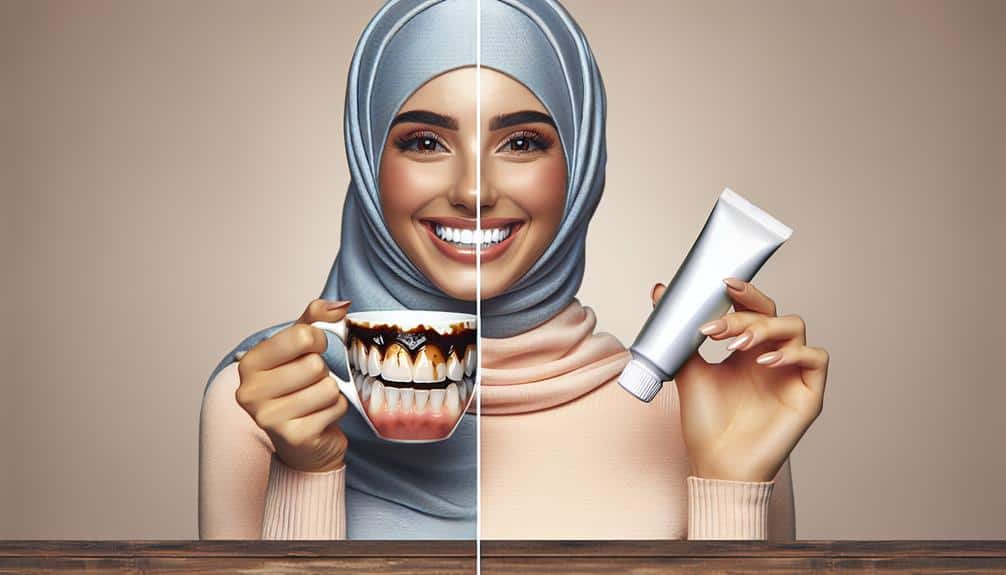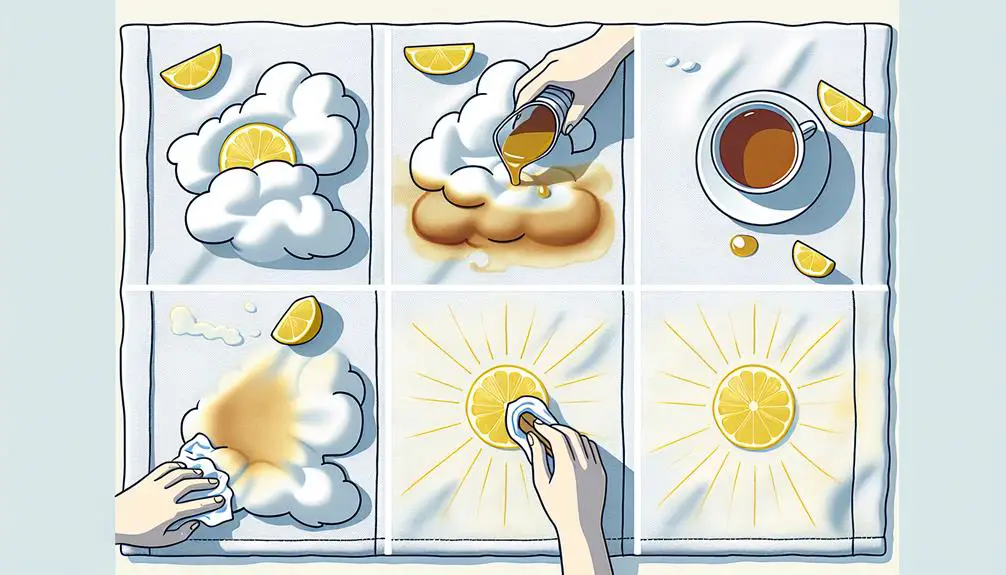To remove tea stains from your teeth, try gentle circular brushing with a soft-bristled toothbrush. Focus on stained areas without being too aggressive. Consider natural remedies like crushed strawberries or oil pulling with coconut oil. Explore professional whitening treatments or lifestyle changes like using a straw for dark drinks. DIY options include making a baking soda paste or a citrus rinse. These methods can help you combat those stubborn tea stains effectively. Additional tips and techniques are available to further enhance your smile.
Key Points
- Use a soft-bristled toothbrush at a 45-degree angle.
- Employ gentle circular motions while brushing.
- Focus on stained areas with care.
- Avoid aggressive brushing to protect enamel.
- Rinse mouth after tea consumption to prevent stains.
Brushing Techniques for Tea Stains
To effectively remove tea stains from your teeth, adjust your brushing technique to target the areas where discoloration is most significant. When dealing with tea stains, it's essential to focus on maintaining gum health and protecting enamel.
Start by choosing a soft-bristled toothbrush to prevent any damage to your gums while effectively cleaning your teeth. Hold the toothbrush at a 45-degree angle to your gums and use gentle circular motions to clean the front, back, and chewing surfaces of your teeth thoroughly. Pay special attention to the areas where tea stains are most visible, ensuring that you brush gently but effectively.
Proper brushing techniques not only help in removing tea stains but also contribute to overall gum health by reducing the buildup of plaque and tartar. Remember, aggressive brushing can lead to gum recession and enamel wear, so it's vital to be gentle yet thorough in your approach.
Natural Remedies for Whiter Teeth
For a natural approach to achieving whiter teeth, consider incorporating home remedies that can help brighten your smile without harsh chemicals or treatments. Herbal solutions have been used for centuries to promote oral health and whiten teeth. For example, rubbing a small amount of crushed strawberries or baking soda on your teeth can help remove surface stains and brighten your smile.
Additionally, the antimicrobial properties of coconut oil make it a popular choice for oil pulling, a traditional Indian folk remedy that involves swishing oil around in your mouth to improve oral health and whiten teeth naturally. Oil pulling with coconut oil can help reduce bacteria in the mouth, preventing plaque buildup and promoting whiter teeth.
Remember to use these herbal solutions and oil pulling techniques consistently for best results. While natural remedies can be effective, maintaining good oral hygiene practices such as regular brushing and flossing is crucial to keep your teeth healthy and white.
Professional Whitening Options to Consider
Consider exploring professional whitening options to enhance the brightness of your smile effectively and efficiently. Professional whitening treatments offer a quick and reliable way to combat tea stains on your teeth. Here are some alternatives to contemplate:
- In-office treatments: Dentists can perform professional whitening procedures that are more potent than at-home kits. These treatments often involve the use of stronger whitening agents and advanced technology to deliver visible results in a single session.
- Customized whitening trays: Some dental offices provide custom-made whitening trays that fit your teeth perfectly. These trays are designed to be used at home with professional-grade whitening gel, offering a convenient and effective way to whiten your teeth gradually.
- Laser whitening: This in-office treatment involves the use of a laser to enhance the whitening effect of the bleaching agent, providing a quicker and more intensive whitening experience.
- Combination treatments: Dentists may recommend a combination of in-office and at-home treatments for optimal results. This approach combines the immediate impact of professional treatments with the convenience of at-home maintenance.
Lifestyle Changes to Prevent Staining
Making adjustments to your daily habits can play a crucial role in preventing stains on your teeth. When it comes to maintaining a bright smile, focusing on your dietary habits and oral hygiene is key. To prevent staining from tea or other beverages, consider using a straw to minimize contact between the liquid and your teeth. Additionally, rinsing your mouth with water after consuming tea can help wash away any residue that may lead to discoloration.
In terms of dietary habits, reducing the consumption of tea, coffee, and other dark-colored beverages can greatly decrease the likelihood of staining. Opting for lighter-colored beverages or choosing alternative options can also help preserve the whiteness of your teeth. Incorporating crunchy fruits and vegetables like apples and carrots into your diet can act as natural teeth cleaners, preventing stains from setting in.
Maintaining good oral hygiene practices such as regular brushing, flossing, and using mouthwash can also aid in preventing tea stains. By being mindful of your habits and making these simple adjustments, you can enjoy your favorite beverages without compromising the brightness of your smile.
DIY Teeth-Whitening Recipes
To enhance the brightness of your smile and combat stains, exploring do-it-yourself teeth-whitening recipes can be a beneficial and cost-effective approach. These natural remedies can help remove surface stains and brighten your teeth without harsh chemicals.
Here are four effective DIY teeth-whitening recipes you can try at home:
- Citrus rinse: Create a simple yet effective rinse by mixing fresh lemon or orange juice with water. The citric acid in the fruits can help break down stains on the teeth and whiten them naturally. Remember to rinse your mouth thoroughly with water after using this mixture to prevent any potential enamel erosion.
- Baking soda paste: Combine baking soda with a small amount of water to create a paste. The mild abrasiveness of baking soda can help scrub away stains on the teeth's surface. However, use this paste sparingly as excessive use can wear down tooth enamel over time.
Frequently Asked Questions
Are There Any Specific Types of Tea That Are More Likely to Cause Stains on Teeth?
Certain types of tea, like black tea, are more likely to cause stains on teeth due to their higher tannin content. To prevent tea staining, consider drinking green or herbal teas that are less likely to discolor your teeth.
Can Drinking Tea Through a Straw Help Prevent Tea Stains on Teeth?
Drinking tea through a straw can aid in preventing tea stains on your teeth. By using a straw, you minimize direct contact of tea with your teeth, reducing the risk of staining and promoting better oral health.
How Often Should I Visit a Dentist for Professional Teeth Whitening Treatments?
Like a compass guiding a ship, regular dental check-ups point the way to a brighter smile. Professional whitening treatments can be scheduled every 6-12 months, with at-home care in between for best results and oral health.
Are There Any Long-Term Effects of Tea Staining on Teeth That I Should Be Aware Of?
To prevent long-term implications of tea staining on your teeth, prioritize oral health. Regular dental visits, proper brushing, and flossing can help. Addressing stains promptly with professional cleanings can maintain oral hygiene and prevent lasting discoloration.
Can Using Whitening Toothpaste Specifically Designed for Tea Stains Be More Effective Than Regular Whitening Toothpaste?
You know what's better than regular whitening toothpaste? Whitening toothpaste designed for tea stains! Say goodbye to those stubborn discolorations with the power of targeted care. Elevate your oral hygiene game!



